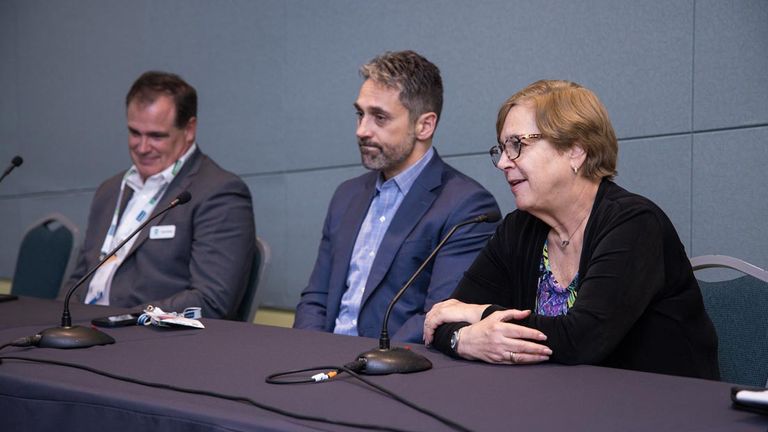San Juan, Puerto Rico, welcomed nearly 1,000 travel industry members — including more than 500 travel advisors — for the 2023 American Society of Travel Advisors’ annual Global Convention, which took place this week from May 2-4.
This year’s Global Convention, which coincided with Global Travel Advisor Day on May 3, was held at the Puerto Rico Convention Center in San Juan and included a full roster of general sessions, educational workshops, networking opportunities, ASTA’s black-tie Advocacy dinner, evening receptions and more.
 This year’s event took place in Puerto Rico.
This year’s event took place in Puerto Rico.
Credit: 2023 American Society of Travel Advisors
Here are some of ASTA’s top priorities and our top takeaways from this year’s conference.
Takeaway 1: Travel Advisors Should Adopt New Technology — Where It Makes Sense
Educational sessions for seasoned advisors at the conference included workshops on personality selling, crisis communication tactics with clients, growing your online presence, protecting your agency against fraud and legal risks and more. But a reoccurring theme in travel advisor workshops, discussions and even the opening general session was the implications of artificial intelligence (AI) in the travel industry.
The overarching takeaway? Adopting new technology is important, but there’s no substitute for the human touch and duty of care, according to Zane Kerby, president and CEO of ASTA, who addressed the topic during May 3’s opening general session.
 Zane Kerby, president and CEO of ASTA
Zane Kerby, president and CEO of ASTA
Credit: 2023 American Society of Travel Advisors“Recent developments on artificial intelligence have been dominating the headlines,” he said. “Our profession embraces technology; there is room and use for these powerful new tools to enhance all aspects of the travel experience.”
But this technology “can’t feel, and it never will,” he added.
Our profession embraces technology; there is room and use for these powerful new tools to enhance all aspects of the travel experience.
“As flawed as our judgment sometimes is, there is no substitute for human empathy, genuine concern and expertise based on actual real-life experiences,” he said. “These are the real tools of your craft. The need for professional empathy is growing, not shrinking.”
Takeaway 2: The Travel Advisor Profession is Growing
For years, travel advisors have been fighting against the perception that the travel agent profession is dead. After decades of projecting negative growth, new statistics from the Bureau of Labor Statistics suggest that the role of “frontline travel advisor” is now projecting 20% growth over the next 10 years, according to Eben Peck, executive vice president of advocacy for ASTA.
 Mentorship is a key focus.
Mentorship is a key focus.
Credit: 2023 American Society of Travel Advisors“So, finally, thanks to COVID-19, I guess our message has gotten through to these folks,” he said during a press conference. “This is not a dying industry. This is a vibrant industry that is growing, and people should want to join us.”
The industry is extremely healthy; it’s growing … outpacing pre-pandemic levels and travel advisors are busier than ever, which is music to our ears.
ASTA’s research confirms an increased interest in using a travel advisor, as well. Fifty percent of people are more likely to use an agent today than they were in the past, which represents a 14% year-over-year increase.
"The industry is extremely healthy; it’s growing … outpacing pre-pandemic levels and travel advisors are busier than ever, which is music to our ears,” Kerby said.
Takeaway 3: Planning Fees Are Now the Norm; Timely Commission Payments Should Be, Too
At last year’s convention, ASTA announced its endorsement of charging professional fees. Currently, upward of 92% of ASTA advisors are charging fees, with the number of agents charging more than $200 per transaction up dramatically.
This year, the focus has shifted to suppliers; ASTA’s Consortia Committee has endorsed a statement
recognizing suppliers who pay commission within 30 days of final payment, with ASTA encouraging all its supplier partners to adopt this practice (and planning to publish a report of suppliers who already have).
The principle is, once you get paid, we should get paid, too.
“We have some steps to take before we publish this list to make sure that it's comprehensive, but we fully intend to do so,” Kerby said. “We want to highlight the good supplier behavior and those who are acting like true partners. The principle is, once you get paid, we should get paid, too.”
Takeaway 4: Corporate Travelers Are Under Attack By American Airlines Amid Its NDC Release
As ASTA continues its battle with American Airlines over its NDC launch, Kerby says that corporate travelers, specifically, are facing discrimination from the airline.
"ASTA is extremely concerned that corporate travelers are being discriminated against with extraordinary price discrepancies in the major and main places that they buy business travel, which is through Concur,” Kerby said. “Up to 73% of all corporate travel books to Concur, which runs through Sabre.”
The price discrepancies range from 20% to more than 129% higher in Concur than through any other channel that American Airlines is filing its fares, including with online travel agencies and on American Airlines’ website.
ASTA is extremely concerned that corporate travelers are being discriminated against with extraordinary price discrepancies in the major and main places that they buy business travel, which is through Concur.
“We took this to the Department of Transportation, and we are hopeful that the regulators in Washington will take a really hard look at this,” he said. “We're also pursuing that with the Department of Justice, because we feel like there's certainly discriminatory practices that we don't think are fair to business travelers.”
Other advocacy efforts, led by Peck’s team, include implementing ASTA’s wish list of priorities during the re-writing of the FAA Reauthorization Bill; submitting comments for a Department of Labor proposal that dictates rules for independent contractors; and preparing members for ASTA’s upcoming Legislative Day.
More information on advocacy efforts can be found here.
Takeaway 5: ASTA Is Investing in Attracting, Mentoring New Travel Advisors
In an effort to attract new talent to the travel industry, ASTA is embarking on a marketing program in partnership with Norwegian Cruise Line. The campaign, which will include paid advertising, plans to highlight the profession’s high earning potential, flexibility and travel perks. A new professional overview that explains the ins and outs of the career has been downloaded more than 1,000 times via ASTA’s website.
 Nexion’s Jackie Friedman (far right) will be the new chair of the ASTA Board of Directors.
Nexion’s Jackie Friedman (far right) will be the new chair of the ASTA Board of Directors.
Credit: 2023 American Society of Travel AdvisorsA new mentorship program is also in the works at ASTA (currently in its pilot stage, with 10 mentors and 10 mentees participating). The program will roll out for six months. Mark Meader, senior vice president industry affairs and education at ASTA, anticipates it will eventually become the “industry standard” for travel advisor mentorship.
Takeaway 6: Sustainability Continues to Be Top of Mind
A key focus of ASTA, according to Marc Casto, senior vice president of Flight Centre and the current chairman of the board at ASTA, is sustainability. ASTA has planted tens of thousands of trees in a reforestation effort and the association has now offset all carbon emissions for all its events and meetings.
We can’t promote the world if we don’t protect the world.
ASTA also recently introduced its first Green Sustainability Travel Award; Delta Air Lines was the inaugural recipient thanks to its effort to switch to sustainable airplane fuel.
“We can’t promote the world if we don’t protect the world,” Casto said. “We have dramatically increased educational content on action.”
Takeaway 7: Nexion Travel Group’s Jackie Friedman Takes the Role of Chair of the Board
ASTA’s new executive committee was announced at the conference. After completing his two-year term this week, Casto has passed his torch to Jackie Friedman, president of Nexion Travel Group, effective at the conclusion of the conference.
New appointees also included Altour’s Lee Thomas, who will serve as vice chair; Duglin Travel Group’s Kelly Bergin, who will serve as secretary-treasurer; and BCD Travel’s Kathy Bedell, who will serve as chair of the Corporate Advisory Council.
“It’s an incredible honor to be the new chair for the ASTA Board of Directors,” Friedman said. “My sincere thanks go to Marc Casto for his leadership over the past two terms, and I am excited to work with this tremendous group of travel professionals.”
Under Casto’s leadership as chair, ASTA implemented its 20 by 25 initiative (which aims to expand ASTA membership to 20,000 members by 2025). Over the past two years, the organization has seen a 25% increase in paid members and a 23% increase in total membership. Friedman says she will continue the progress Casto has made through a “acquire, engage, retain” approach.
“We have to grow our association,” she said. “There should be no excuse for a travel advisor or a supplier for that matter, to not support our trade association. So, acquire means getting advisors on board by telling the ASTA story. And by getting them onboard, the best way to keep them is to engage them. Engage them through the chapter system, engage them through the amazing events that ASTA is doing. If we do those things really well, then the retention of advisors will be that much easier. And that is the only way that we are going to achieve Marc [Casto’s] 20 by 25 initiative.”
Next year’s Global Convention is heading back to the mainland next year, taking place in Dallas.